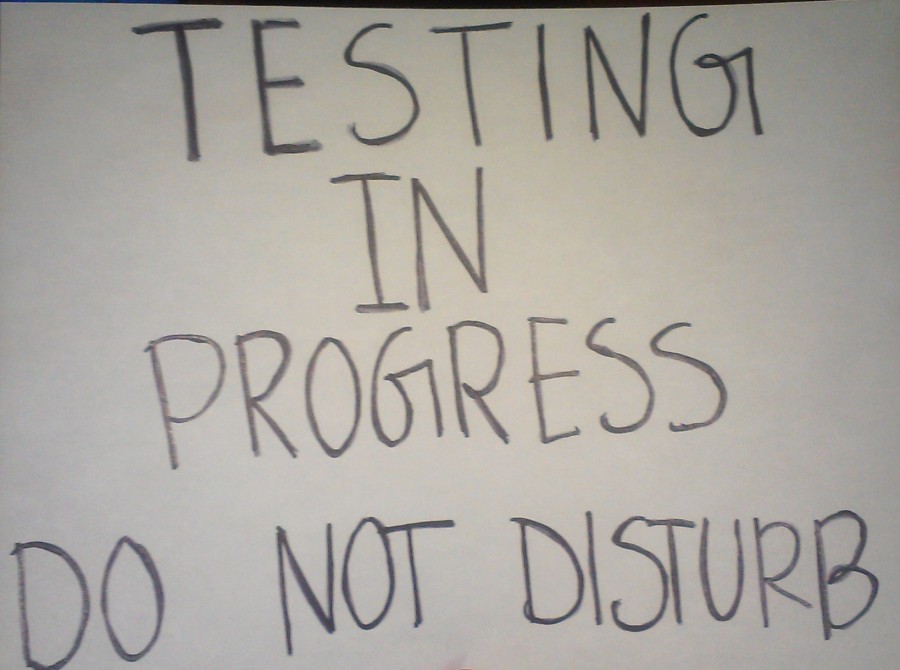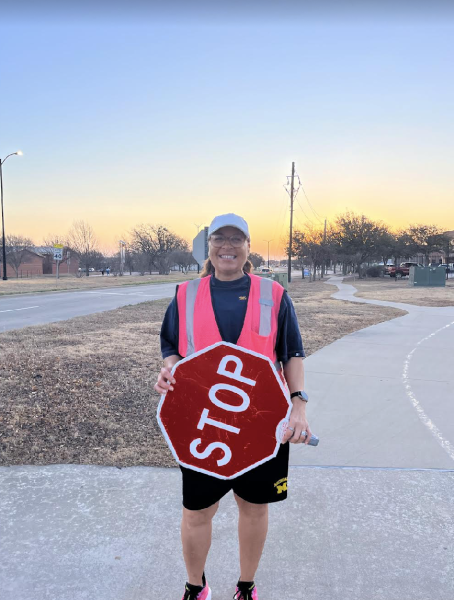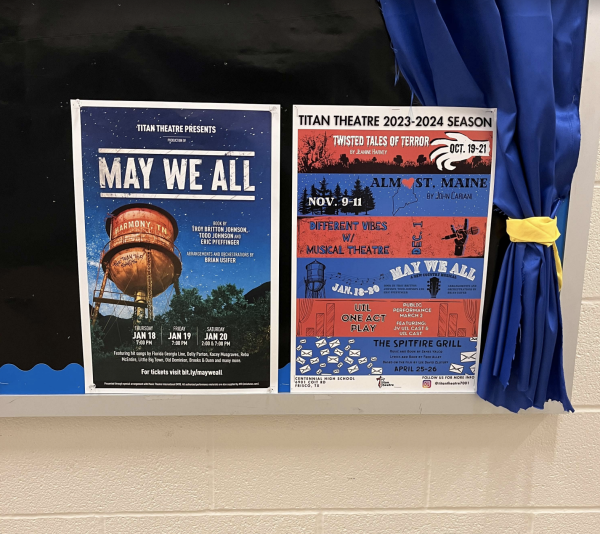We’re Stressed Out
March 26, 2016
Brace yourselves, Titans.
The most dreadful time of the year is approaching.
Testing season.
No matter what classes you’re taking, PAP, AP, or regular, YOU WILL TEST. Regardless of if it’s the EOC (English I on Wednesday, English II on Thursday in case I am somehow the first to tell you), the AP test, or the SAT/ACT, you will sit in a plastic chair for hours, the white walls of the gym closing in around you, the deafening sound of silence slowly driving you mad, teachers and administrators watching your every move, and your precious device being taken away, headed for the equivalent of prison for phones, their fate to be succumbed to the imagination.
And of course, the test packet and answer sheet. The dreadful bubbling in of your every piece of personal information, down to what you ate for breakfast that morning (I honestly wouldn’t be surprised if they actually asked us that, to “evaluate all variables that may affect your performance”). The seemingly endless pages of stuff you all of a sudden forgot. And remember that if you dare to do as much as cough, they will surround you like sharks.
It’s no wonder, then, that American teenagers are now the most stressed-out age group in the U.S., according to APA’s 2013 Stress In America survey. While adults rate their stress at a 5.1 on a 10-point scale, teens rate their stress levels at 5.8, far exceeding a healthy level of stress (3.9/10). During summer, however, teens reported a stress level of 4.6.
Even before the pressures of work and adulthood set in, for most teens, stress has already become a fact of daily life. Stress affects the body from head to toe. And while it’s normal to have some stress in life, if stress persists at high levels for a long time, it can have lasting negative effects on health. This sets the stage early for unhealthy behaviors and lifestyle choices that may increase the risk of developing health problems down the road, such as anxiety, high blood pressure and a weakened immune system, and can contribute to diseases such as depression, obesity and heart disease.
In fact, 31 percent of teens report feeling overwhelmed as a result of stress, 30 percent say that they feel sad or depressed as a result of stress, unfortunately upping the suicide rate, 36 percent report feeling tired or fatigued because of stress, and 23% report skipping a meal due to stress. Only 16 percent of teens say their stress levels have declined in the past year, while 31 percent say their stress has increased in the past year. 42 percent of teens say that they’re either not doing enough to manage their stress or they’re not sure if they’re doing enough.
Out of all the things that stress us out, school and tests rank as #1. Here are some signs you could be one of the many stressed teens:
- Feeling depressed, edgy, guilty, tired
- Having headaches, stomachaches, trouble sleeping
- Laughing or crying for no reason
- Blaming other people for bad things that happen to you
- Only seeing the downside of a situation
- Feeling like things that you used to enjoy aren’t fun or are a burden
- Resenting other people or your responsibilities
So what is stress? What is it that makes us feel so miserable? Stress is your body’s way of responding to any kind of demand. It can be caused by both good and bad experiences. When people feel stressed by something going on around them, their bodies react by releasing chemicals into the blood. These chemicals give people more energy and strength, which can be a good thing if their stress is caused by physical danger. But this can also be a bad thing, if their stress is in response to something emotional and there is no outlet for this extra energy and strength.
With the right tools, though, you can learn to manage stress before it takes a toll on your health. Managing daily stress can also lead to a more overall positive outlook on your life and well-being. You can do things such as increasing your physical activity, and getting enough shut-eye. Ideally, adolescents should get nine hours a night, but according to APA’s Stress in America Survey, teens say they sleep an average of just 7.4 hours on a school night (and we all know the introduction of Netflix made this average drop like your head on the couch at 3:00 a.m.). To maximize your chance of sleeping soundly, cut back on watching TV or engaging in a lot of screen time in the late evening hours. Don’t drink caffeine late in the day and try not to do stimulating activities too close to bedtime.
In addition, teens should strive to strike a balance. When you plan your week, schedule time to get schoolwork done, but also schedule time to have fun. When it’s time to enjoy yourself, try not to worry about school or homework. Of course, enjoy yourself- you deserve it. Find hobbies or activities that bring you joy. That might be listening to music (“Stressed Out,” by Twenty-One Pilots, anybody?), going to the movies or drawing. Make a point to keep doing these things even when you’re stressed and busy. Talk to a parent, teacher or other trusted adult. Even though it may seem that your teachers are out to get you, a scapegoat for all the stress we go through (or perhaps blame the State of Texas- they’re the ones making us take these tests in the first place, but that’s a whole nother story), teachers actually are eager to help.
As for those tests, remembering these tips to help you ace them and lower your stress and anxiety!
- Don’t forget to get enough sleep the night before the test. Your memory recall will be much better if you’ve had enough rest. Cramming doesn’t work. If you’ve followed a study plan, the night before the test you should do a quick review and get to bed early.
- Don’t skip breakfast the morning of the test- you work better on a full stomach. Get to school early and do a ten-minute power study right before the test, so your brain is turned on and tuned up.
- Bring at least two pens/pencils with good erasers and any other resources that your instructor allows you to.
- When you first receive your test, do a quick survey of the entire test so that you know how to efficiently budget your time and pace yourself.
- Keep a positive attitude throughout the whole test and try to stay relaxed. If you start to feel nervous take a few deep breaths to relax (but don’t stand up, they might bring in the Frisco PD).
- Do the easiest problems first. Don’t stay on a problem that you are stuck on, since time is a factor. If you don’t know an answer, skip it. Go on with the rest of the test and come back to it later. Other parts of the test may have some information that will help you out with that question.
- Don’t rush. Read the entire question and pay attention to the details.
- Ask the instructor for clarification if you don’t understand what they are asking for on the test (again, be careful, they might call in the FBI to take you and your test away to the mysterious land of voided tests and inoffensive, wide-eyed students never to return, if you ask too much).
- Write legibly. If the grader can’t read what you wrote, they’ll most likely mark it wrong.
- Always read the whole question carefully. Don’t make assumptions about what the question might be.
- Don’t worry if others finish before you. Focus on the test in front of you.
- If you have time left when you are finished, look over your test. Make sure that you have answered all the questions. Only change an answer if you misread or misinterpreted the question because the first answer that you put is usually the correct one. Watch out for careless mistakes and proofread your essay and/or short answer questions.
So Titans, this testing season, remember to relax, as this simple life change holds many short and long-term benefits.
Don’t be intimidated by the NCIS-esque visions of the testing environment I’ve so kindly reminded you of. And if all else fails, even though we don’t know each other, I believe in you.
You can–and you will–ace that test.













